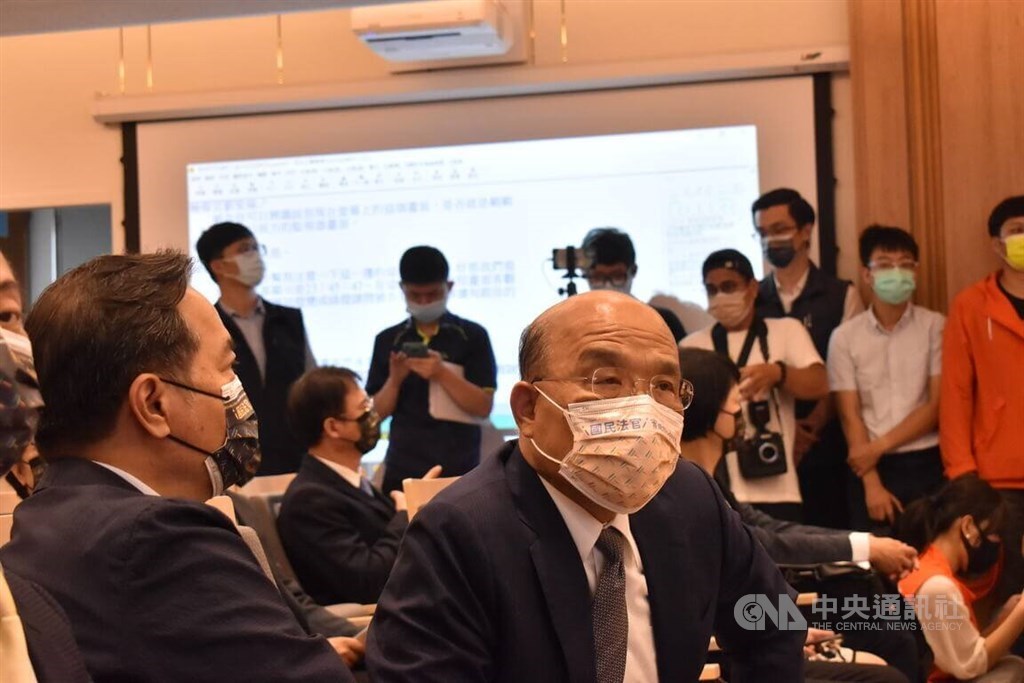
Taipei, Aug. 20 (CNA) A proposed bill to regulate the content of online platforms has been shelved, amid heavy criticism from service providers and the public, who have expressed concerns about the implications for free speech, privacy and the future of the internet industry.
“Freedom of speech is a value we hold dear, but many people have fallen victim to disinformation,” Premier Su Tseng-chang (蘇貞昌) told reporters Friday. “We need to hold public consultations in all quarters on how to achieve a balance.”
Following Su’s comments, the National Communications Commission (NCC) announced a postponement of the fourth and final public hearing on its draft digital intermediary service bill, which was scheduled to be held Aug. 25, after which the draft would have been sent to the Cabinet.
A Cabinet official, who asked not to be named, told CNA that Su had decided to halt the bill because people still have “deep reservations” about the proposals, which must first be resolved.
The draft bill establishes provisions for service providers in their intermediary role of connecting consumers with goods, services and content, including telecommunication, caching, cloud storage, e-commerce, social media and online forums.
Since the draft bill was posted on the Public Policy Online Participation Platform for discussion, it has been panned by more than 99.58 percent of the 30,571 people who have commented on it.
One of the main concerns is that service providers will be forced to put a “warning” on posts deemed by Taiwan authorities as rumor, disinformation or illegal content, pending a court order secured by the authorities to remove the information.
That rule would open the door to potential abuse by government authorities, said Chou Kuan-ju (周冠汝), a member of the Taiwan Association for Human Rights.
The attempt to give “too much power” to the government to control internet content is modeled on Singapore’s law against fake news, which has been widely criticized for its chilling effect on civil society since it was introduced in 2019, Chou said at a public hearing on Aug. 18.
According to the NCC’s draft bill, service providers will also be required to limit the spread of illegal information, through the establishment of a mechanism that would allow “trusted flaggers” to report such issues.
Once the service providers identify any illegal content, they will be obliged to take actions that may include suspending or terminating the user’s account, and removing, algorithmically downgrading or disabling access to the illegal content, the draft bill states.
Chen Chien-jen (陳建仁), deputy executive director of the Bahamut Game Community, said he is strongly opposed to the bill because it “severely infringes on the rights to freedom of expression on the Internet.”
If the bill become law, it is safe to assume that service providers will receive a massive number of reports about potentially illegal content, and they will “remove whatever content is flagged,” without first checking its legality, “so as to avoid liability risks,” said Chen, whose organization runs a local gamer’s platform.
It might be easier to assess content related to national security or public safety, but when it comes to issues such as personal disputes, copyright infringement and defamatory content, service providers cannot know immediately whether the content is illegal, Chen said.
Expressing similar concerns, Campaign for Media Reform Chairwoman Lo Huei-wen (羅慧雯) said she is worried that the bill will give service providers greater power to censure content or arbitrarily take down posts.
The bill’s potential to impose on people’s right to privacy is also another concern, according to attorney Chen Yu-an (陳宇安).
In a Facebook post, Chen drew attention to the section of the bill that would allow government authorities to seek a court or administrative order to obtain data from storage operators.
Crystal Hsu (許惠嵐), senior public policy director of the messaging app Line Taiwan, also expressed worry about the privacy issue, saying private chats in the LINE app may fall victim to the relevant regulations.
Under the provisions of the bill, the operators of LINE and other online platforms, which have a total of 2.3 million active domestic users, would fall under the regulatory system. The others include Instagram, Youtube, Facebook, Yahoo Auctions, and Dcard — the largest anonymous discussion forum in Taiwan.
The maximum fine for violations of the 20-plus regulations pertaining to service providers is NT$10 million (US$ 33.2 million), according to the draft bill.
PTT Bulletin Board System, one of Taiwan’s largest online discussion forums, has appealed to the NCC for exemption from the regulations.
If PTT is regulated under the draft bill, it would effectively “shut us down,” PTT legal consultant Hsu Che-jen (許哲仁) said.
Prior to Premier Su’s comments, Taiwan Internet and E-Commerce Association (TiEA), Digital Marketing Association (DMA), and Digital Economy Association, Taiwan (DEAT) issued a joint statement, calling on the government to shelve the draft bill.
It would be impractical to establish a single regulatory system for all the service providers in the fields of telecommunications, social media and other categories, given that they all have different industrial landscapes, the associations said.
Furthermore, the bill would impede innovative development of digital startups, because the hefty penalties that would be imposed, even in the event of unintentional violations, would made them more risk adverse, the associations said.




















